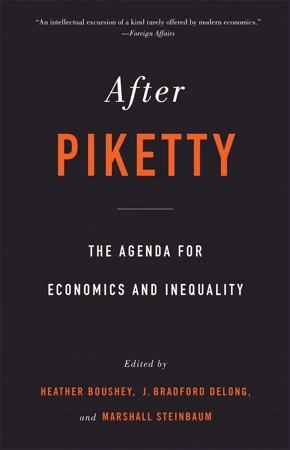After Piketty – The Agenda for Economics and Inequality

Blurb
Thomas Piketty’s Capital in the Twenty-First Century in 2013 explained that unequal wealth has less to do with productivity or efficiency than with ‘the process by which wealth is accumulated and distributed’ which ‘contains powerful forces pushing towards divergence or an extremely high level of inequality’. Piketty found that the return on capital (r) consistently floated above the growth rate (g): r > g concluding in the idea that wealth grows faster than economic output and in this way people with capital will continually receive a larger part of the total wealth of the economy resulting in unequal wealth distribution. Also the book describes that only a shock that increases growth, such as education or technology, or one that decreases capital, such as wars, will lessen wealth inequality. After Piketty call attention to some important points that were missed in Piketty’s book. After Piketty: The Agenda for Economics and Inequality explores in a detailed way the ‘process by which wealth is accumulated’ and the ‘powerful forces’ that shape the high level of inequality. Some important conclusions that the book highlights are: The process of wealth accumulation is not ‘guaranteed, but instead must be maintained via government administration and the legal systems’. The ‘powerful force’ causing inequality is digital technology. First, technology enables capital to move towards cheap labour. Second, it substitutes low-cost workers with machines, it is the ‘outsourcing’ of jobs, which ‘allows redistribution of gains upwards’; through outsourcing, large firms create a ‘competition between service providers’, which results in lower wages for people working for them. An important point is that the process of accumulation and the forces of power that provide wealth inequality prove correct that is r > g, but high inequality is avoidable.Book summary
After Piketty opens with a discussion by Arthur Goldhammer, Piketty's translator into English, of the reasons for Capital's phenomenal success, followed by the published reviews of Nobel laureates Robert Solow and Paul Krugman. The rest of the book is devoted to newly commissioned essays that interrogate Piketty's arguments. Suresh Naidu and other contributors ask whether Piketty said enough about power, slavery, and the complex nature of capital. Laura Tyson and Michael Spence consider the impact of technology on inequality. Heather Boushey, Branko Milanovic, and others consider topics ranging from gender to trends in the global South. Emmanuel Saez lays out an agenda for future research on inequality, while a variety of essayists examine the book's implications for the social sciences more broadly. Piketty replies to these questions in a substantial concluding chapter. An indispensable interdisciplinary work, After Piketty does not shy away from the seemingly intractable problems that made Capital in the Twenty-First Century so compelling for so many.
Comment from our editors:
A very useful book for students and young researchers to understand, predict and change economic inequality.

